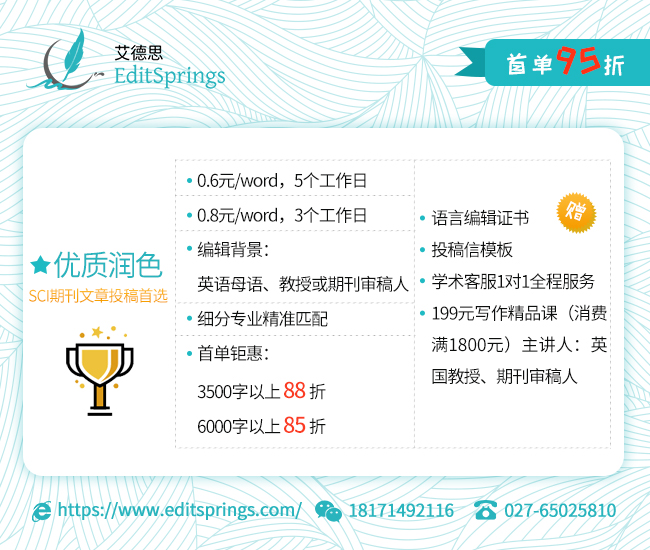来自美国波士顿

微信扫码关注公众号进行登录


完善安全信息
为了您的账号安全,请完善以下信息


来自美国波士顿
更专业的论文润色机构
微信扫码登录
微信扫码关注公众号进行登录


来自美国波士顿
更专业的论文润色机构
手机验证码登录
账号密码登录
微信扫码登录
微信扫码关注公众号进行登录
工商管理国际会议SCI期刊专刊信息2条,会议,SCI,EditSprings,艾德思
 工商管理 ICE-B 2019 International Conference on e-Business 全文截稿: 2019-02-28 开会时间: 2019-07-26 会议难度: ★★ 会议地点: Prague, Czech Republic 网址: The International Conference on e-Business, ICE-B 2019, aims at bringing together researchers and practitioners who are interested in e-Business technology and its current applications. The scope of the conference covers low-level technological issues, such as technology platforms, internet of things and web services, but also higher-level issues, such as business processes, business intelligence, value setting and business strategy. Furthermore, it covers different approaches to address these issues and different possible applications with their own specific needs and requirements on technology. These are all areas of theoretical and practical importance within the broad scope of e-Business, whose growing importance can be seen from the increasing interest of the IT research community. CONFERENCE AREAS 1 . Enterprise Engineering 2 . Applications 3 . Mobility 4 . Collaboration and e-Services 5 . Technology Platforms 6 . Sustainable e-Business 7 . class="js_cpc_area res_iframe cpc_iframe" src="/cgi-bin/readtemplate?t=tmpl/cpc_tmpl">
工商管理 ICE-B 2019 International Conference on e-Business 全文截稿: 2019-02-28 开会时间: 2019-07-26 会议难度: ★★ 会议地点: Prague, Czech Republic 网址: The International Conference on e-Business, ICE-B 2019, aims at bringing together researchers and practitioners who are interested in e-Business technology and its current applications. The scope of the conference covers low-level technological issues, such as technology platforms, internet of things and web services, but also higher-level issues, such as business processes, business intelligence, value setting and business strategy. Furthermore, it covers different approaches to address these issues and different possible applications with their own specific needs and requirements on technology. These are all areas of theoretical and practical importance within the broad scope of e-Business, whose growing importance can be seen from the increasing interest of the IT research community. CONFERENCE AREAS 1 . Enterprise Engineering 2 . Applications 3 . Mobility 4 . Collaboration and e-Services 5 . Technology Platforms 6 . Sustainable e-Business 7 . class="js_cpc_area res_iframe cpc_iframe" src="/cgi-bin/readtemplate?t=tmpl/cpc_tmpl">
工商管理 Telecommunications Policy TP AI Special Issue Call for Papers 全文截稿: 2019-04-30 影响因子: 中科院JCR分区: • 大类 : 工程技术 - 4区 • 小类 : 电信学 - 4区 网址: , the field of artificial intelligence (AI) is experiencing a period of intense progress. Such enablers include: (i) the exponential growth of data that can be used to train learning machines; combined with (ii) more powerful computer processing capabilities that can be used for deep neural networks and other learning techniques; and (iii) advances in the algorithms that can make machines very effective at solving a variety of problems across industries. In fact, this enhanced version of AI is being applied to a whole range of sectors, automating all sorts of processes that were too complex for either industry or service-related economic activities to tackle in the past. In particular, 5G is likely to facilitate further development and creative use of AI for businesses by channeling rich data collected from its sensors into AI systems, and it will eventually pave the road to another boom of AI industry. This implies that telecommunications network operators will play a key role in gatekeeping and supplying data to firms and public organizations. It is also certainly possible for network operators and related telecom industry to evolve into AI platform firms offering various individualized services to consumers. AI systems have achieved impressive performance enhancement over the last five years, in spite of still being very narrow—domain specific—and not displaying the general-purpose reasoning capability exhibited by humans. Experts and analysts have compared this progress to the industrial revolution in its capacity to change both economy and society. AI systems are going to transform business practices and our ways of living, eventually influencing all aspects of our society and exposing new social and policy issues. As a main example, ITU has been already running a global forum,AI for Good, to "formulate strategies to ensure trusted, safe and inclusive development of AI technologies and equitable access to their benefits.' Looking into the specific domain of AI and policy, no review of its developments and economic effects would be complete without mentioning the alarm surrounding the potential, future but also present, dangers of AI for society. Basically, there are concerns about: (i) AI eventually making people superfluous; (ii) AI being used by regimes to target certain populations; (iii) AI being employed to expand cyberattacks and augment the threat of physical attacks; (iv) AI being applied to increase privacy invasion and social manipulation through surveillance, persuasion and deception; and (v) the application of AI methods leading to devices and systems that are untrustworthy and dangerous. An example of the above concerns surrounding the impact of AI is the "online bubble filters' that major Internet service providers use to personalize content offered to their users. Of course, a direct consequence of the potential malicious usages of AI is the discussion of whether AI needs to be regulated at this stage or in the near future. There are moves advocating specific regulation in different jurisdictions, each taking a different path. For instance, the US has proposed a "Future of AI Act' that would create an advisory committee to examine the impacts that emerging AI technologies will have on many aspects of life and launch proposals in accordance. Also in the US (and UK) tradition, there are moves from market players towards some type of self-regulation. China has also launched a number of initiatives focused on ethics-related standardization mostly with respect to specific industries such as driverless cars and robotics. These initiatives are typically led by industry with support from government bodies. In the case of the EU it has been declared a need for a high level of data protection, digital rights and ethical standards in AI and robotics, as well as preparedness for the social changes caused by AI. More specifically into the regulatory domain, France's President Macron has also launched the idea of three main challenges for this domain: analysis of significant market power, negative externalities because of industries being digital and not territorially-based, and privacy in a context of democracy, accountability and sovereignty. The House of Lords in the UK has also called for safeguards against the monopolization of data by large companies. Preserving algorithm openness so that they can be checked for transparency and potential bias is another major regulatory challenge in the realm of AI. Additionally, there might be a case for the impact of AI on free and fair international trade. Beyond mere regulation, there is currently a considerable political and ethical debate on the lawful usage of AI. Ideally, there should be steps towards a common, internationally recognized, ethical and legal framework for the design, production, use and governance of AI, robotics, and "autonomous' systems. In fact, policy, not regulation, is the key constituent of future decisions on AI. AI is expected to raise —is, in fact, raising— ethical issues that will challenge the collective preferences of each world region. In this context, the guest editors are seeking high-quality papers, qualitative or quantitative, that address historical, theoretical, and practical (business and policy) aspects of AI. Our expectation is to publish AI focused papers that offer solid foundation to those, especially social SCIentists, who want to start AI related research. We invite contributions related to but not limited to: - Historical review of AI research and its impact on economy and/or society - Introduction of machine learning and deep learning for social SCIentists with exemplary cases of application - Impact on economy and society of the evolution of algorithms for machine learning - Analysis of AI ecosystems for entrepreneurship, innovation and business, including human capital, financials, venture capital, effects of patents, clusters, support from governments, etc. - Relevant case studies of AI leveraged innovations for business management - Telecommunication firms' strategic use of AI - AI and public policies for resolving social issues such as privacy, security, trust and ownership of data, and so on. - AI algorithm openness and open innovation analysis, including transparency and analysis of possible bias. - Ethical aspects of AI, in particular initiatives from the perspective of policy-making - Regulation and self-regulation of AI, including significant market power analysis, examination of externality effect, standardization, codes of conduct and legislative actions. - Analysis of society preparedness for AI. - Macroeconomic effects of AI: international trade, growth, employment, etc.
关注艾德思,获取更多详细内容!
更多科研论文服务,动动手指,请戳 论文润色、投稿期刊推荐、论文翻译润色、论文指导及修改、论文预审!
语言不过关被拒?美国EditSprings--专业英语论文润色翻译修改服务专家帮您!


特别声明:本文转载仅仅是出于传播信息的需要,并不意味着代表本网站观点或证实其内容的真实性;如其他媒体、网站或个人从本网站转载使用,须保留本网站注明的“来源”,并自负版权等法律责任;作者如果不希望被转载或者联系转载稿费等事宜,请与我们接洽。
凡注明来源为“EditSprings”的论文,如需转载,请注明来源EditSprings并附上论文链接。













 鄂公网安备:
鄂公网安备: